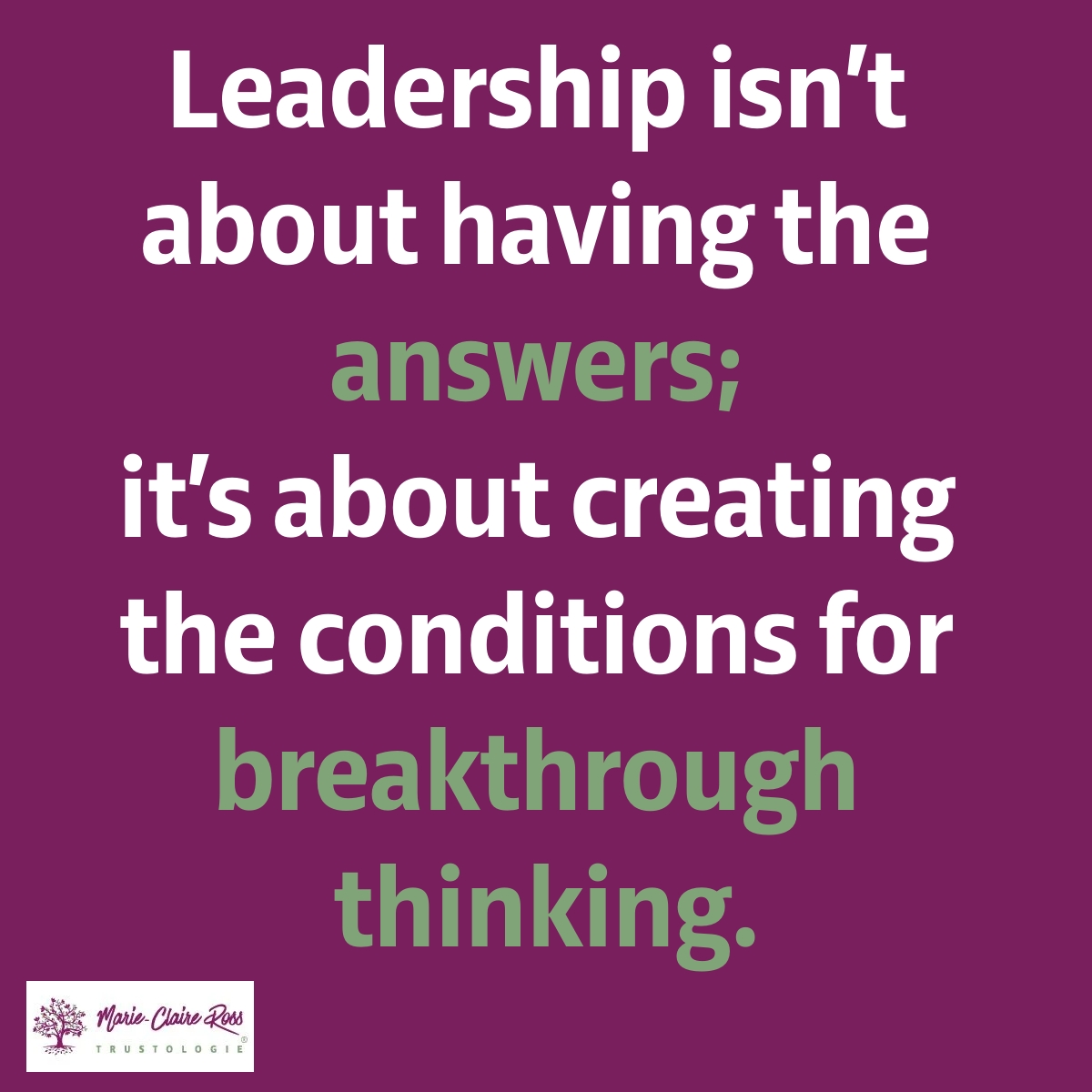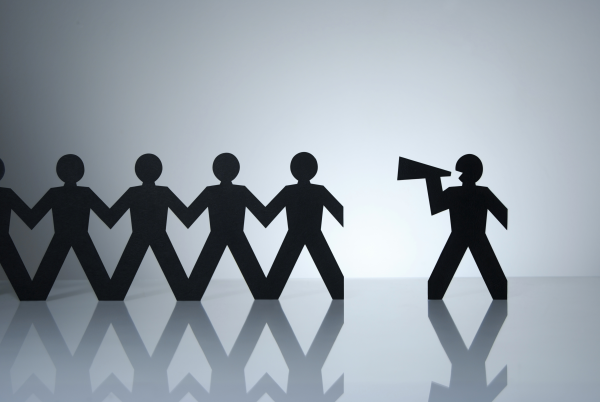8 min read
Beyond the "Why": 5 Coaching Secrets to Unlock Curiosity in Leadership
When my daughter was 17 months old, she discovered a superpower: the word “Why?”For the next two years, it was her response to almost everything.
Develop leaders, strengthen executive teams and gain deep insights with assessments designed to accelerate trust and performance.

Transform how your leaders think and perform with keynotes that spark connection, trust and high-performance cultures.

Explore practical tools, thought-leadership and resources to help you build trusted, high-performing teams.

Trustologie® is a leadership development consultancy founded by Marie-Claire Ross, specialising in helping executives and managers build high-trust, high-performing teams.

5 min read
Marie-Claire Ross : Updated on November 28, 2023

A CEO of a well-known Australian brand came to me to coach his CFO, Bill. Bill had been with the company for over thirty years and was proud that he had served the founder and previous CEO for decades.
But now with the first external CEO in charge of the company, the new CEO wanted a more dynamic finance department who were quicker at producing financial reports and more strategic.
Unfortunately, Bill was stuck in his old ways, so I was brought in to coach him. The CEO didn't trust him to deliver, nor did his finance team trust him to keep calm when the pressure was on. It wasn't long before I realised that some of the poor performance of his team stemmed from Bill's aversion to meetings.
"I hate them." he told me, "They are a waste of time. Nothing changes in the work we do, it's the same all the time. I stopped running meetings because everyone knows what to do."
Seems like a reasonable assumption.
But Bill was missing the point of meetings. And that is they provide the opportunity for information sharing, collective learning, improved problem-solving and better decision-making.
The very things his team were unable to do.
But not only that, meetings also create connection and alignment which are all important for wellbeing and trust. They help people learn the culture of the organisation and contribute to engagement, motivation and accountability.
Having Bill learn to do regular meetings properly totally changed the performance of his team. But like many people Bill hated meetings for the wrong reasons.
According to an Atlassian study, 45% of people felt overwhelmed by the number of meetings they attended, while 47% complained that meetings were the number one time waster at work. A study from the University of North Carolina found that 65% of leaders said meetings stopped them from completing their work.
The interesting thing is the number of meetings people have to attend in any given week seems to keep increasing. You could almost say that because meetings can be so beneficial to organisational performance, we keep having them. Lots of them.
To fix meetings, leaders get trained on how to do them more effectively, reduce the time they take or be careful in who they invite.
But again, we have been focused on fixing the wrong things. It's not how long they take or how they are run that's the main problem in most cases.
It's when we have them.
We keep scheduling meetings without even considering whether they are going to help our energy levels or impede them.
A study by Zhang and Spreitzer tracked the daily work activities of over 400 full-time knowledge workers from diverse industries involving intellectual work.
The study found that leaders negatively impacted their productivity when they:
If you are like most people, you probably schedule meetings one after the other believing that will save you time. But what we don't realise is that if we don't have time to decompress in between meetings, we lose our productivity and effectiveness.
Not only that, when we have meetings is really important to consider as well.
As Dan Pink, says in his appropriately named book, When, we need to plan meetings by listening to our bodies and being in tune with when we are the most productive and clear-headed.
Mornings are best for analytical work or tough decisions, afternoon is best for admin or routine work when our energy is low and late afternoon is best for creative work. The opposite tends to be true for night-owls.
Knowing when you, and your team, are at your best gives you the competitive edge. This means that for most people it's better to have a challenging meeting (either cognitively or personally) in the morning.
Ideally, you only schedule one tough meeting per day.
In the Zhang and Spreitzer study, they found it was best for people to be intentional about when they scheduled meetings and how they complemented their individual tasks.
They found that people's energy levels were best when they combined:
For example, on a day when you have an important report to write, the best type of meeting to have would be a low-pressure update on the new company's IT system. This will actually offer a respite for your energy levels. Ideally, you would do the high-stakes report in the morning, when you have better focus, and then the low pressure meeting in the afternoon.
We need to be more strategic about when we schedule in meetings, rather than having them because we, or are people, are available.
If you are in charge of your calendar, then be very intentional about scheduling meetings and tasks to best suit your energy levels.
Likewise, if you are in charge of a team, you also want to consider the best time collectively that will improve people's productivity, not deplete it.
Questions to consider include:
What is the purpose of the meeting?
Who are the participants?
Are there recurring patterns in team energy levels?
How long is the meeting expected to last?
What is the team's daily workflow?
Does the meeting disrupt natural breaks in the workday?
To boost your productivity, it's crucial to consider how your scheduling choices can impact the structure of your workday, potentially affecting your energy levels and overall efficiency. By considering these questions, we can make informed decisions about when to schedule meetings to optimise energy levels for both ourselves and our teams.
The next time someone says they hate meetings, remember that it's not that meetings are bad. It's just that we are bad at recognising our productivity cycles and having the courage to align ourselves with our bodies for peak performance.
Adopting a more holistic approach to workday scheduling is a game-changer. Who knows - if we get better at knowing our productivity cycles, we might actually learn to love meetings.

8 min read
When my daughter was 17 months old, she discovered a superpower: the word “Why?”For the next two years, it was her response to almost everything.

11 min read
I have a friend who often finds herself at the mercy of her emotions. Recently, she called me to rehash a confrontation she’d had with a group of...

9 min read
True leadership presence isn’t a performance or a set of charisma hacks; it is the felt experience of who you are being in the room. By cultivating...

We've all experienced being at a company speech and feeling our anger grow as the company leader waffled on about a whole lot of stuff we knew...

Did you know that every fifth of a second your brain is scanning the environment to make sure you are safe? We are wired to seek safety and regularly...

One of the things I get to do in my job is interview employees about what their senior leadership team or organisation needs to do, in order for them...